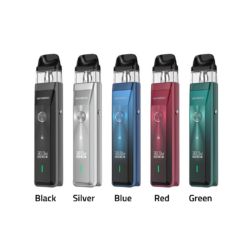In an era where electronic cigarettes have gained widespread popularity, the impact of vaping on various aspects of health continues to be a subject of intense scrutiny. While the well-documented consequences of vaping on respiratory and cardiovascular systems have been explored, a lesser-known yet crucial aspect is emerging – how vaping influences our sleep patterns. Sleep, a fundamental component of overall well-being, plays a pivotal role in maintaining physical and mental health. As we navigate the complexities of this topic, we aim to unravel the mysteries behind how the modern habit of vaping may be subtly shaping our sleep architecture and, consequently, our overall health.
-
Vaporesso XROS PRO Kit
R650.00 -
Uwell Caliburn G3 Pod System
R540.00 -
Vaporesso XROS 4 Kit
R580.00 -
Uwell Caliburn Tenet Pod Kit
R525.00
The Link Between Nicotine And Sleep
Nicotine, the primary addictive component of tobacco and a prevalent ingredient in many e-cigarettes, is known for its stimulating effects on the central nervous system. While its impact on wakefulness and alertness has been extensively studied, its influence on sleep remains a complex and evolving subject.
Research suggests that nicotine, being a stimulant, can disrupt the delicate balance required for a restful night’s sleep. Nicotine activates the release of neurotransmitters such as dopamine and norepinephrine, heightening arousal and increasing heart rate and blood pressure. Consequently, individuals who consume nicotine-containing products, including through vaping, may experience difficulties in initiating and maintaining sleep.
One notable aspect of nicotine’s influence on sleep is its ability to interfere with sleep architecture. Studies indicate that smokers, and by extension vapers, often experience a reduction in overall sleep duration and disturbances in sleep continuity. This can manifest as fragmented sleep patterns, characterised by frequent awakenings during the night.
Moreover, nicotine’s impact on the sleep cycle extends to its influence on REM (rapid eye movement) sleep, a phase critical for cognitive function and emotional regulation. Some studies suggest that nicotine may suppress REM sleep, potentially compromising the restorative aspects of the sleep cycle.
Interestingly, the timing of nicotine exposure also plays a role in its effects on sleep. Using nicotine close to bedtime may exacerbate sleep disturbances, as the stimulant effects are more pronounced when the body is attempting to transition into a state of rest.
It is essential to recognise that individual responses to nicotine can vary, and some individuals may be more sensitive to its sleep-disrupting effects than others. Factors such as the amount of nicotine consumed, frequency of use, and individual susceptibility all contribute to the complex interplay between nicotine, vaping and sleep.
Nicotine And Circadian Rhythms
The intricate dance of our internal biological clock, known as the circadian rhythm, orchestrates the ebb and flow of various physiological processes throughout the day. From regulating sleep-wake cycles to influencing hormone release, the circadian rhythm plays a pivotal role in maintaining overall health. The introduction of nicotine has the potential to significantly impact these finely tuned biological rhythms.
Nicotine’s influence on circadian rhythms stems from its ability to interact with the body’s intricate network of neurotransmitters and receptors. One key player in this system is the neurotransmitter dopamine, which nicotine prompts the release of in the brain. This dopamine surge can trigger a state of increased alertness and arousal, disrupting the natural ebbing of energy levels that typically occurs as part of the circadian rhythm, especially during the evening.
The disruption of circadian rhythms by nicotine can lead to difficulties in initiating and maintaining sleep, especially when nicotine exposure occurs close to bedtime. Sleep-wake cycles are intricately connected to the circadian rhythm, and any disturbances in this rhythm can result in sleep disorders and a decrease in overall sleep quality.
Moreover, the impact of nicotine on circadian rhythms extends beyond the immediate sleep-wake cycle. Studies suggest that nicotine may influence the rhythmic release of hormones such as melatonin, a key player in regulating sleep. Melatonin production typically increases in the evening, signalling the body to prepare for sleep. However, nicotine exposure can alter this natural progression, potentially leading to difficulties in falling asleep at the desired bedtime.
The effects of nicotine on circadian rhythms are not uniform across all individuals. Sensitivity to nicotine and its impact on circadian rhythms can vary based on factors such as individual physiology, the timing of nicotine exposure, and the overall quantity of nicotine consumed. Those who engage in vaping or use nicotine-containing products should be mindful of these potential disruptions to circadian rhythms, as they can have broader implications for overall health and well-being.
Tips For Vapers To Improve Sleep Hygiene
While the relationship between vaping and sleep is complex, individuals who use e-cigarettes can take proactive steps to enhance their sleep hygiene and promote better sleep. Incorporating these tips into one’s routine may help mitigate potential disruptions caused by nicotine and improve overall sleep quality.
Establish A Consistent Sleep Schedule
Aim for a regular sleep-wake cycle by going to bed and waking up at the same time every day, even on weekends. Consistency reinforces the body’s internal clock, promoting a more stable circadian rhythm.
Limit Nicotine Exposure Before Bed
Given nicotine’s stimulating effects, try to avoid vaping or using nicotine-containing products at least a few hours before bedtime. This allows time for the stimulant effects to diminish, reducing the risk of interference with the sleep initiation process.
Create A Relaxing Bedtime Routine
Develop a calming pre-sleep routine to signal to your body that it’s time to wind down. Activities such as reading a book, taking a warm bath, or practising relaxation techniques can help prepare the mind and body for rest.
Optimise Sleep Environment:
Ensure your sleep environment is conducive to rest. Keep the bedroom dark, quiet, and cool. Consider using blackout curtains, earplugs, or a white noise machine to create an ideal sleep setting.
Limit Screen Time Before Bed
The blue light emitted by electronic devices, including those used for vaping, can interfere with the production of melatonin, a hormone crucial for sleep. Aim to reduce screen time at least an hour before bedtime.
Stay Active During The Day
Regular physical activity can promote better sleep, but try to complete vigorous exercise earlier in the day. Exercise releases endorphins, which can increase alertness if done too close to bedtime.
Watch Caffeine And Stimulant Intake
Monitor your consumption of caffeinated beverages and other stimulants. These substances can amplify the stimulating effects of nicotine, potentially exacerbating sleep disturbances.
Mindful Eating
Be mindful of your diet, especially close to bedtime. Avoid heavy meals and excessive fluids, which can contribute to discomfort and disrupt sleep.
Seek Professional Guidance:
If sleep difficulties persist, consider consulting a healthcare professional or sleep specialist. They can provide personalised advice and strategies to address specific sleep concerns.
Gradual Nicotine Reduction
For those looking to reduce nicotine intake, consider a gradual approach. Gradually tapering nicotine levels may help minimise withdrawal symptoms and allow for a smoother transition.
In the realm where vaping intersects with the delicate realm of sleep, a nuanced and intricate relationship emerges. The impact of nicotine on sleep patterns, circadian rhythms, and overall sleep hygiene is a subject of growing interest and concern. As individuals navigate the terrain of e-cigarette use, it becomes imperative to consider the potential consequences for one’s nightly rest.
Understanding that nicotine, as a potent stimulant, can influence the initiation and maintenance of sleep allows for informed decision-making. From the disruption of circadian rhythms to potential alterations in sleep architecture, acknowledging these intricacies is the first step toward creating a more sleep-friendly approach to vaping.










